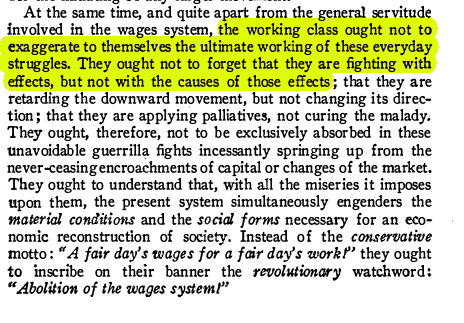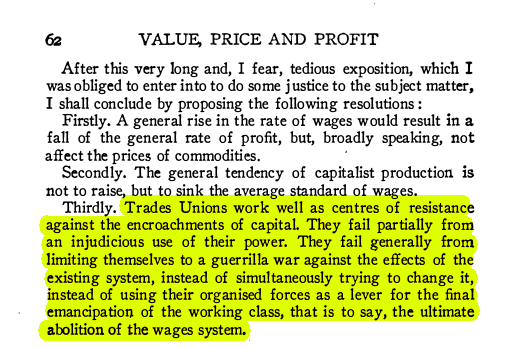First world social democracy has only been in decline since dissolution of USSR and rise of neoliberalism. The threat of socialist revolution kept capitalists from being too exploitative. It is unsustainable, capitalists will want their power back. Look at what happened to NHS in the U.K.
Also 'freedoms' for private enterprises and 'rights' for workers are straight up contradictory.
Exactly. Marx said "between equal rights, force decides." We have a class dictatorship of the bourgeoisie. It doesn't matter if your form of government is a so-called "multiparty liberal democracy" or a "parliamentary representative republic" when 95+% of the people who hold office are bourgeois and primarily make money through owning means of production or speculating on financial assets, rather than selling their labor power like everyone else. If the bourgeoisie guarantees rights for the worker, it is only because they have cynically calculated that it is in their long term interests to allow some crumbs to fall from their table. They will withdraw those "rights" as soon as they see fit. As soon as capitalism's immune system detects a threat. You can only get so far with liberal democracy, trade unions, and worker-owned cooperatives, because, while those things are nice, and certainly better than feudalism, you still fundamentally have a bourgeois class-dictatorship where all the so called "rights" of the worker are granted by the bourgeoisie and enforced through their class's monopoly on violence. They decide when rules can be bent, broken, changed, or ignored. The police and the military exist purely to enforce their ownership over the means and conditions of production.
A worker coop taking care of its workers will always be less profitable than an exploitative capitalist company, and therefore out-competed. It's what happens when you design all of society around profit.
First, there is no rule that a worker co-op taking care of its workers will be less profitable than an exploitative company. At first glance, it seems reasonable. But it's not a truism. For example, a well-taken care of worker is likely to be more productive than one who feels exploited.
Second, profits are not how companies compete. Profits are by definition the extra money that goes into the owners' pockets. Companies compete in many different ways; quality, marketing, price, etc. The fact that there are many successful worker co-ops in capitalist nations should provide some evidence here.
Third, one could imagine a nation that mandates that all companies are worker co-ops. They would still be profit-driven private companies, but would be controlled by the workers (who would also be the ones saying the profit).
You're missing the point that those successful coops are only successful to the extent they are profitable within the larger capitalist framework, which means worker consideration will be secondary and most importantly they have to compete with capitalist enterprises that engage in heavy exploitation and wage suppression
As long as the capitalist profit motive survives it will in general win against those firms that don't engage in exploitation and wage suppression and limit the growth of competing coops, it's creates a ceiling for genuine worker friendly coops and ties them to the greater capitalist network in the form of regulating capitals
Profitability is the be all and end all of capitalist enterprise, the methods of competition are irrelevant (quality, marketing, price, etc) unless they produce sufficient profit, otherwise from the logic of capitalism there's no point in initiating the enterprise in the first place, this is the direct consequence of capitalist ownership of the means of production
Your mistake is assuming capitalist markets are a universal phenomenon that can be controled by all classes, that's not true, capitalist markets only exist as the result of a specific form of property relations, the logic that drives workers and the logic that drives capitalists are not the same, workers want their wages to raise, capitalists want profit, wages cut into profits, do you see the contradiction of the coop capitalism you're imagining?
Coops can't grow when regulating capitals limit their potential, and workers won't self-raise their wages if it means the over-arching profitability of the company is at stake hence threatening unemployment, in the world you're imagining the workers would still want to do away with this self-shackling profit system that limits their ability to grow and sustain themselves
You're making a hell of a lot of assumptions, both about me, and about the nature of reality.
You're also spouting a lot of nonsense. "The logic of capitalism" is a meaningless phrase. You're attributing a lot of assumptions onto something that just means "the means of production can be privately owned".
The fact of the matter is that there are existing, successful worker co-ops. That alone disproves most of your claims that you take as axioms.
Ok, there are actual implications and definitions behind the terms you're throwing around haphazardly, fact of the matter is you don't know what you're talking about, that's fine, you don't have the relevant knowledge of economics or theory, technical or historical, so a lot of what I said probably went over your head
So let's clear up some basics, there is a logic to capitalism; private ownership of the means of production is the framework, profitability is the fuel and commodity production is the output, those aren't assumptions, that is the "nature of reality" under capitalism
And finally I didn't say there are no successful coops, read more carefully, I said they're only successful to the extent they are profitable and are limited by competing firms that act as regulating capitals, firms compete by cutting costs or increasing productivity, but productivity is tied to technical developments, so that can't always be relied on, but cutting costs i.e. wages is always the first resort, hence the disadvantage for coops who theoretically value worker compensation over other more common capitalist concerns
That buddy is a form of systemic logic
I'd add also an inherent necessity in Capitalism's stability is the marriage of concentrated riches with the state's power and its monopoly on violence. Should worker co-ops ever seriously threaten the wrong bourgeois lot, restrictive laws that only apply to the co-op will appear, unlawful actions will go ignored, state officials will be pressed to harass, legal means will be levied, etc, all until the co-op is tanked. 'Successful' worker co-ops are only ever permitted to the point where they don't meaningfully threaten any bourgeois power, profit is paid no heed in these situations.
From Value, Price & Profit :
Show Show
Show
Marx's critique of Trade Unions above also applies to cooperatives.
You're making a hell of a lot of assumptions, both about me, and about the nature of reality.
Prove wages don't cut into profits.
Prove profits don't cut into wages
Prove co-ops don't have to make profits
"The logic of capitalism" is a meaningless phrase.
Private ownership over the means of production, generalized commodity production, industrialization, and generalized wage labor are the logical conditions of capitalism. Explain how this is not the case.
The fact of the matter is that there are existing, successful worker co-ops.
Successful in a capitalist context. Which is an exploitative context. They have to make profit to survive, which means they have to pay workers less than the value of their labor power on average. Read Value Price & Profit. Read Wage Labor & Capital. Read Capital. Read Theories of Surplus Value.
That alone disproves most of your claims that you take as axioms.
Worker-owned co-ops are definitely preferable to the alternative form of capitalist enterprise, but they can only get you so far, just like trade unions. These are tools for slightly alleviating the suffering of the worker in a capitalist context, but they are not the solution to capitalism.
EDIT: Coming back to this a few days later to drop some Stalin:
The most widespread, mass organisations are trade unions and workers' co-operatives (mainly producers' and consumers' co-operatives). The object of the trade unions is to fight (mainly) against industrial capital to improve the conditions of the workers within the limits of the present capitalist system. The object of the co-operatives is to fight (mainly) against merchant capital to secure an increase of consumption among the workers by reducing the prices of articles of prime necessity, also within the limits of the capitalist system, of course. The proletariat undoubtedly needs both trade unions and co-operatives as means of organising the proletarian masses. Hence, from the point of view of the proletarian socialism of Marx and Engels, the proletariat must utilise both these forms of organisation and reinforce and strengthen them, as far as this is possible under present political conditions, of course.
But trade unions and co-operatives alone cannot satisfy the organisational needs of the militant proletariat. This is because the organisations mentioned cannot go beyond the limits of capitalism, for their object is to improve the conditions of the workers under the capitalist system. The workers, however, want to free themselves entirely from capitalist slavery, they want to smash these limits, and not merely operate within the limits of capitalism. Hence, in addition, an organisation is needed that will rally around itself the class-conscious elements of the workers of all trades, that will transform the proletariat into a conscious class and make it its chief aim to smash the capitalist system, to prepare for the socialist revolution.
Such an organisation is the Social-Democratic Party of the proletariat.
This Party must be a class party, and it must be quite independent of other parties—and this is because it is the party of the proletarian class, the emancipation of which can be brought about only by this class itself.
This Party must be a revolutionary party—and this because the workers can be emancipated only by revolutionary means, by means of the socialist revolution.
This Party must be an international party, the doors of the Party must be open to all class-conscious proletarians—and this because the emancipation of the workers is not a national but a social question, equally important for the Georgian proletarians, for the Russian proletarians, and for the proletarians of other nations.
Hence, it is clear, that the more closely the proletarians of the different nations are united, the more thoroughly the national barriers which have been raised between them are demolished, the stronger will the Party of the proletariat be, and the more will the organisation of the proletariat in one indivisible class be facilitated.
Hence, it is necessary, as far as possible, to introduce the principle of centralism in the proletarian organisations as against the looseness of federation — irrespective of whether these organisations are party, trade union or co-operative.
It is also clear that all these organisations must be built on a democratic basis, in so far as this is not hindered by political or other conditions, of course.
What should be the relations between the Party on the one hand and the co-operatives and trade unions on the other? Should the latter be party or non-party? The answer to this question depends upon where and under what conditions the proletariat has to fight. At all events, there can be no doubt that the friendlier the trade unions and co-operatives are towards the socialist party of the proletariat, the more fully will both develop. And this is because both these economic organisations, if they are not closely connected with a strong socialist party, often become petty, allow narrow craft interests to obscure general class interests and thereby cause great harm to the proletariat. It is therefore necessary, in all cases, to ensure that the trade unions and co-operatives are under the ideological and political influence of the Party. Only if this is done will the organisations mentioned be transformed into a socialist school that will organise the proletariat—at present split up into separate groups—into a conscious class.
Such, in general, are the characteristic features of the proletarian socialism of Marx and Engels.
Most large successful worker co-ops make up the majority of their profit through the exploitation of part-time and seasonal laborers that are not on the same pay-scale and insurance plans as their full-time and co-owned employees. They then limit their full-time employment to a certain number of individuals, usually by understaffing, dangling the possibility of fulltime employment at these part-time members, but also by exploiting the surplus of third-world workers.
Co-ops within a capitalist market context cannot escape the basic wage-labor exploitation that is baked into the system and compete at-scale with larger more hierarchical firms.
I have worked for multiple worker co-ops in the U.S. and this is usually the case.
Co-ops may be profitable enough to stay in business and productive in a community, but if you plan on competing against larger organizations in meaningful ways, good luck.
Third, one could imagine a nation that mandates that all companies are worker co-ops. They would still be profit-driven private companies, but would be controlled by the workers (who would also be the ones saying the profit).
Yes, that’s called socialism
would have been more graceful to admit that you don't understand what a dotp is
No? A private enterprise means it's not run by the state. Worker coops absolutely are private enterprises.
I mean okay if you want to be a debate nerd about it. There are a variety of definitions for the term "private enterprise"
https://www.lawinsider.com/dictionary/private-enterprise
Half those definitions agree with me, and the other half say the definition is in some external material not linked to on that site.
I don't want to be a "debate nerd". You're the one being argumentative.
What you're thinking of is just one of numerous potential theoretical transitional states of socialism or a Frankenstein form of super military Keynesianism
But it's not something that's ever likely to happen, capitalists and the liberal states who serve them would outlaw workers coops before if ever got to a point they threaten capitalist property relations, that's the whole point of controlling the state, to prevent a hypothetical like the one you just advanced
I'm gonna copypaste what I said somewhere else ITT:
You can only get so far with liberal democracy, trade unions, and worker-owned cooperatives, because, while those things are nice, and certainly better than feudalism, you still fundamentally have a bourgeois class-dictatorship where all the so called "rights" of the worker are granted by the bourgeoisie and enforced through their class's monopoly on violence. They decide when rules can be bent, broken, changed, or ignored. The police and the military exist purely to enforce their ownership over the means and conditions of production.
TL;DR Worker Owned Co-Ops exist embedded in a capitalist economy and are subject to its laws
In that case, Uncle Sam will do everything in his power to crush them. See Huawei.
You really have to ignore the entire history of capitalist theory and history to pretend this is remotely a coherent take, besides the ancaps, social liberals are the most utopian of all liberal sects, they are willfully blind to the contradictions of class, property ownership, and the functions of the state
They fundamentally don't understand the social basis for the ideology they claim to uphold, it was only with the rise of socialism that liberals began to construct these social fantasies of class harmony and submission under capitalism, in the old days they were more sober about this shit as Adam Smith readily admitted
Civil government, so far as it is instituted for the security of property, is in reality instituted for the defense of the rich against the poor, or of those who have some property against those who have none at all
But avarice and ambition in the rich, in the poor the hatred of labour and the love of present ease and enjoyment, are the passions which prompt to invade property, passions much more steady in their operation, and much more universal in their influence. Wherever there is great property, there is great inequality. For one very rich man, there must be at least five hundred poor, and the affluence of the few supposes the indigence of the many. The affluence of the rich excites the indignation of the poor, who are often both driven by want, and prompted by envy, to invade his possessions. It is only under the shelter of the civil magistrate that the owner of that valuable property, which is acquired by the labour of many years, or perhaps of many successive generations, can sleep a single night in security. He is at all times surrounded by unknown enemies, whom, though he never provoked, he can never appease, and from whose injustice he can be protected only by the powerful arm of the civil magistrate continually held up to chastise it. The acquisition of valuable and extensive property, therefore, necessarily requires the establishment of civil government. Where there is no property, or at least none that exceeds the value of two or three days labour, civil government is not so necessary. (WN V.ii.2)
regarding the Adam Smith quote, I love the number of Adam Smith quotes that sound like Marx quotes. you can really break a person's brain with those.
Show
This is why I like Theories of Surplus Value so much. It was going to be volume 4 of Capital but Marx died before Volume 2 was even finished and Engels died before compiling volume 4 from Marx's notes. Eventually Kautsky got a hold of these notes, but his edition of Theories of Surplus Value is no longer in print. Then Riazanov in the Soviet Union bought them from Germany just in time to avoid them getting burned by the nazis. He compiled them into a serviceable 3 volumes. Theories of Surplus Value is basically Marx going over all the famous European bourgeois political economists leading up to him. He goes over the French physiocrats. He goes over Adam Smith. He goes over Ricardo. He goes over Malthus. He goes over Mill. He builds an entire history of the concept of Surplus value (i.e. unpaid labor, i.e. exploitation) and how it was understood and misunderstood prior to his writing capital. I wish he had lived long enough to actually give us the full version. Marx's take on Adam Smith is that he basically figured out surplus value, but couldn't grapple with the concept properly, and thus "reverts" to being a "mere physiocrat" in much of his writing:
Quoting Marx talking about Adam Smith:
Adam Smith very acutely notes that the really great development of the productive power of labour starts only from the moment when it is transformed into wage-labour, and the conditions of labour confront it on the one hand as landed property and on the other as capital. The development of the productive power of labour thus begins only under conditions in which the labourer himself can no longer appropriate its result. It is therefore quite useless to investigate how this growth of productive powers might have influenced or would influence “wages”, taken here as equal to the product of labour, on the hypothesis that the product of labour (or the value of this product) belongedto the labourer himself.
Adam Smith is very copiously infected with the conceptions of the Physiocrats, and often whole strata run through his work which belong to the Physiocrats and are in complete contradiction with the views specifically advanced by him. This is so, for example, in the theory of rent, etc. For our present purpose we can completely disregard these passages in his writings, which are not characteristic of himself, but in which he is a mere Physiocrat.
Till there be property there can be no government, the very end of which is to secure wealth, and to defend the rich from the poor. In this age of shepherds, if one man possessed 500 oxen, and another had none at all, unless there were some government to secure them to him, he would not be allowed to possess them.”
Adam Smith, “ Lectures on Jurisprudence” 1766
guaranteeing rights for Workers
and how is that going, hmmm?
guaranteeing Healthcare and Services
lol. lmao
Don't you Know? The more Words you capitalize In the middle of your sentences, the More Academic and therefore Correct you Are!
Almost as bad as the ones that CAPITALISE random WORDS in a SENTENCE like they're writing the a clickbait YouTube TITLE.
Chud radio hosts in the UK are all inbred aristocrats, they all speak with recieved pronounciation because they think it makes them sound smart.
And the angrier they are the louder that emphasis seems get, right?
Like the rest of the
 is just connective tissue holding together the things they're incandescent with rage over.
is just connective tissue holding together the things they're incandescent with rage over.
Out of curiosity, what language capitalizes words like this? I know German capitalizes every noun, but this post seems arbitrary in the way it uses uppercase letters.
Fuckhead vampire. Suck the vast majority of the planet dry for a few small yards with high fences

 and those privileged enough to reap the rewards. Also deny those same supposed "rights and services for the public" to that same majority they feed on.
and those privileged enough to reap the rewards. Also deny those same supposed "rights and services for the public" to that same majority they feed on.Is it perfect? No, certainly not, and I don't want it to be. I like it just the way it is. It has its flaws depending on Class and Government, and I'm in a very privileged position so I'd much prefer it over communism

Communism will win and you cannot stop it.
My preferred form of Capitalism is present in all first-world nations: guaranteeing rights for Workers and Individuals, Healthcare and Services for the Public, and Freedoms for Individuals
Show
Those so-called "first-world" nations have already lost or are actively losing all their social safety nets, affordable housing opportunities, manufacturing base, and public services to privatization and outsourcing. What you mean is you're privileged and likely wealthy enough to be in an exceptional position of being able to benefit from whatever's left of them. They're also all cracking down on dissent brought about by civil unrest, and arbitrarily oppressing vulnerable groups in an ever escalating war on happiness and prosperity. What freedoms?
These posts do nothing but further antagonize and gaslight people who know full well their material and social conditions directly contradict your sick-to-death narratives about "capitalist exceptionalism".
These doofers have never had to experience how costly realizing those "rights" under bourgeois capitalism is.
People who say things like this often have investments in real estate or something. Being a private landowner makes a person's brain go haywire.
It has its flaws depending on Class
Literally saying ''not my problem''
While I maintain you don't have to read theory to have a reasonable understanding of things it is very clear it really really help some folk's understanding. Like just read the manifesto, it's short and a little outdated by this point but it gives you the basic gist of things and dispells some of the more inane counter arguments.












